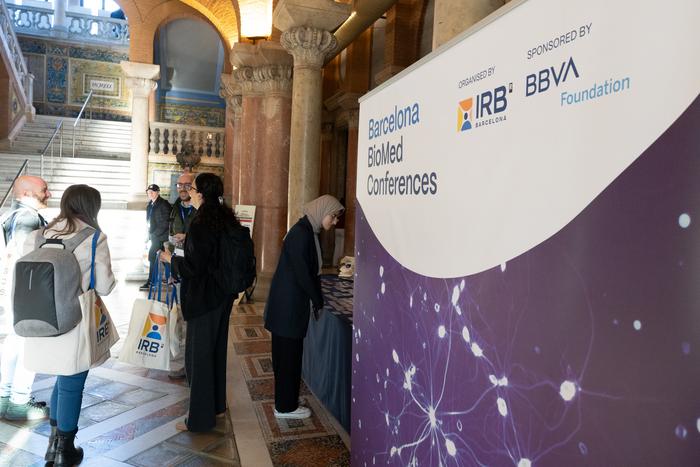
Between March 31 and April 2, 2023, the Institute for Research in Biomedicine (IRB Barcelona) organized the 43rd Barcelona BioMed Conference, which bore the title “AI in Drug Discovery and Biomedicine.” This highly anticipated gathering took place in the historical Casa de Convalescència in Barcelona, Spain. Co-organized by Dr. Patrick Aloy from IRB Barcelona and Dr. Trey Ideker from UC San Diego in the United States, the conference attracted approximately 150 scientists and researchers from around the globe. The aim was to explore and discuss the revolutionary role that artificial intelligence (AI) is playing in transforming the landscape of drug discovery.
Artificial intelligence, often hailed as one of the most significant technological advancements of our era, is increasingly becoming an indispensable tool in biomedicine. The ability of AI to process vast amounts of biological data and create predictive models not only enhances our understanding of fundamental cellular processes but also pushes the boundaries in the design and development of new therapeutic compounds. The conference provided a platform for esteemed experts to share breakthroughs that could reshape the future of medical treatment.
During the conference’s three-day agenda, leading researchers presented their cutting-edge work and engaged in discussions on crucial topics such as the training of “foundation models” through large datasets in biology. Understanding medical predictions emerged as a theme, highlighting the necessity of accurate interpretation of AI-generated conclusions. Moreover, attendees learned about the methodologies involved in the design of proteins and therapeutic targets, as well as the experimental validation of these novel approaches. Research into robotic laboratories aimed at automating the synthesis of molecules further emphasized the rapid advancements in the field.
A focal point of the discussions was drug design utilizing generative AI strategies. These innovative techniques allow for the de novo creation of chemical compounds tailored to possess specific characteristics, effectively revolutionizing how new drugs are conceptualized. Generative AI has already yielded impressive results, particularly in the context of developing anticancer therapies and novel antibiotics, some of which are currently undergoing clinical trials. This transformative approach has led to the emergence of approximately 15 machine learning-designed drugs that are now in various phases of testing for efficacy and safety.
The dialogue at the conference revealed a fascinating trajectory towards merging robotic systems with artificial intelligence in drug development. The prospect of integrating robotic capabilities to autonomously synthesize compounds proposed by AI bridges a critical gap between theoretical drug design and practical clinical applications. Such advancements could significantly accelerate the pace of drug discovery and deliver novel therapies to patients more efficiently.
As the conference unfolded, the importance of personalized medicine became increasingly apparent. The vision for the future is a healthcare paradigm in which treatments are customized to each individual’s unique molecular profile. Leveraging the capabilities of AI and harnessing extensive biological datasets would make it possible to move away from a one-size-fits-all approach to medicine, thereby improving treatment outcomes and minimizing adverse effects associated with standardized therapies.
Renowned speakers, including Dr. Fabian Theis of the University of Munich and Dr. Marinka Zitnik from Harvard Medical School, enriched the conference with their insights. Dr. Theis discussed the applications of automated learning in biological data analysis, while Dr. Zitnik shared her work on employing artificial intelligence to conduct comprehensive analyses of biomedical datasets. Dr. Ola Engkvist from AstraZeneca and Dr. Julio Sáez-Rodríguez of EMBL-EBI also contributed their valuable expertise, focusing on the computational models used to integrate diverse biomedical data.
Dr. Patrick Aloy, a leading figure in this field and co-organizer of the event, encapsulated the sentiments of many attendees when he remarked on the current era of AI-driven innovation in drug development. He described it as a revolution that not only accelerates the design of new pharmaceuticals but also transforms our understanding of disease mechanisms. Through collaborative efforts and the synergy between AI and biological research, the medical community is on the brink of major breakthroughs that could redefine therapeutic strategies.
The conference attracted attention not only for its content but also for its promising future implications. With a plethora of knowledge and a collaborative spirit among top-tier researchers, the exchange of ideas and innovations serves to propel the field forward drastically. As the conference concluded, participants left with a renewed sense of purpose, equipped with insights that could foster new collaborations and spark the next wave of discoveries to come.
In summary, the burgeoning role of machine learning and AI in drug discovery and biomedicine symbolizes a shift towards a more data-driven and personalized approach to health care. As researchers continue to explore the applications of these technologies, the possibilities for more effective and tailored treatment options appear endless. With each advancement, the partnership between AI and biomedicine solidifies, paving the way for a future where healthcare is not only more efficient but fundamentally more humane, offering hope to millions across the globe.
Subject of Research: AI in Drug Discovery and Biomedicine
Article Title: 43rd Barcelona BioMed Conference; Revolutionizing Drug Discovery Through AI
News Publication Date: April 2, 2023
Web References: IRB Barcelona Conference Details
References: BBVA Foundation Support
Image Credits: IRB Barcelona
Keywords
Artificial Intelligence, Drug Design, Personalized Medicine, Machine Learning, Biological Models, Therapeutic Targets, Generative AI, Automated Learning, Computational Biology, Disease Mechanisms, Biomedical Data, Clinical Trials.
Tags: advancements in therapeutic compound designAI applications in drug discoveryartificial intelligence in biomedicineBarcelona BioMed Conference 2023breakthroughs in medical treatment developmentfuture of AI in drug developmentimpact of AI on cellular processesinternational collaboration in biomedical researchIRB Barcelona research initiativespredictive modeling in biomedical researchrole of data science in biomedicinetransformative power of AI in healthcare





